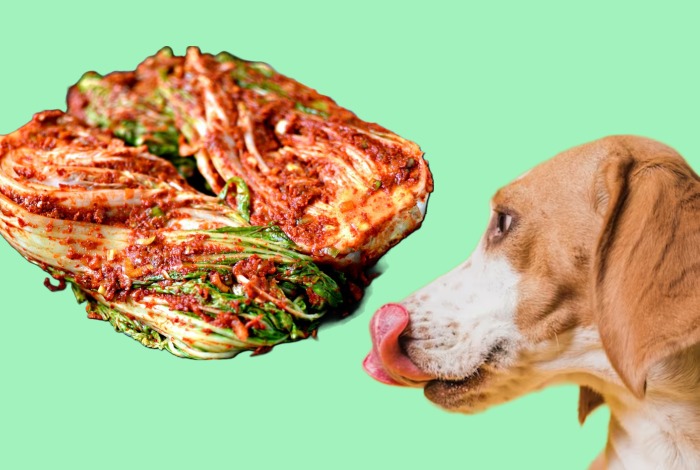As all dog owners are aware, it can be challenging to eat alone when our four-legged pals are present. They want to consume whatever you eat! If you’re eating Korean kimchi, you might be wondering if sharing is permitted. Does kimchi work for dogs? Are they safe there? Yes, it’s fine for your dog to have a small amount of traditional Korean kimchi.
What is kimchi?
Kimchi, often known as kimchee, is a traditional Korean side dish that has recently gained popularity around the globe. It’s a common method of preparing fermented veggies. Kimchi is typically prepared with cabbage or Korean radish, also known as mu, and seasoned with ingredients such as spring onions, garlic, regular onions, chilli peppers, and others. There are other types, including nabak (watery kimchi), kkakdugi (with radish and fermented shrimp), and baechu-kimchi (with full napa cabbage leaves).
The vegetables must first be salted before making this dish. This will stop microorganisms that deteriorate food from later wreaking havoc, along with the red pepper flakes. The chosen seasonings are added after salting. Following canning and fermentation, many species of microorganisms known as lactic acid bacteria begin their job by consuming the sugars and converting them into lactic acid. If you’re not familiar with the idea, it can sound disgusting, yet yogurt and sauerkraut are made using the same method! The bacterial activity imparts a sophisticated and tart flavor.
Kimchi is a dish with significant cultural importance in Korea. People would use it to get through the winter because it can be kept for a long time, and many families still eat it virtually every day. Additionally, it is regarded as healthful due to its high fiber and low fat content, as well as the microbial advantages of fermentation. It makes sense why it’s becoming more and more prevalent here in the US. Although it is strong, many people adore it.
Can dogs eat kimchi?
The short answer is yes, there are no negative effects from giving your dog a small amount of kimchi. There’s no need to freak out if you dropped some on the floor and your dog swooped in before you could stop him (also a typical occurrence, as us dog owners know).
As a result, we wouldn’t advise including kimchi on a regular basis in your dog’s diet, at least not the kinds we enjoy eating as a side dish with rice. The problem with kimchi is that while Korean radish or cabbage by themselves are safe for dogs and they can benefit from the probiotic qualities of lactic acid bacteria, this meal is seasoned with a variety of things that aren’t the best for our pets.
With the salt, we may begin. Although salt is important to stop spoilage and even the growth of harmful bacteria like Salmonella during the fermenting process, most kimchi contains so much of it that if our dogs consume it in big quantities, it may be harmful to them. The seasonings are another issue; the majority of them are simply not dog-friendly. Shrimp that has been fermented is acceptable, however Alliums like garlic, onion, and spring onions aren’t really. Red pepper flakes are not either. Even though they aren’t abundant in kimchi, if your dog eats too much, it could have stomach problems.
In conclusion, it’s preferable to just give the vegetables to your dog before processing them if you want to produce some kimchi! A little won’t hurt, but avoid making it a habit.
Can I give my dogs kimchi?
It’s generally not recommended to give kimchi to dogs. Kimchi is a spicy, fermented cabbage dish that often contains ingredients like garlic, onions, and chili peppers, which can be harmful or irritating to dogs’ digestive systems. It’s best to stick to dog-friendly foods for your furry friend.
Can dogs eat fermented foods?
While some fermented foods can be safe for dogs in moderation, it’s important to exercise caution. Some fermented foods may contain ingredients that can be harmful to dogs, such as excessive salt, spices, or additives. Additionally, the fermentation process can alter the nutritional composition of the food. It’s best to consult with a veterinarian before introducing fermented foods to your dog’s diet.
Can dogs eat kimchi fried rice?
Kimchi fried rice typically contains ingredients like rice, kimchi, vegetables, and often meat or seafood. While plain rice and some vegetables may be safe for dogs, it’s important to avoid feeding them spicy, seasoned, or heavily seasoned foods like kimchi fried rice. The spices, seasonings, and potential ingredients can be harmful or upsetting to their digestive system.

